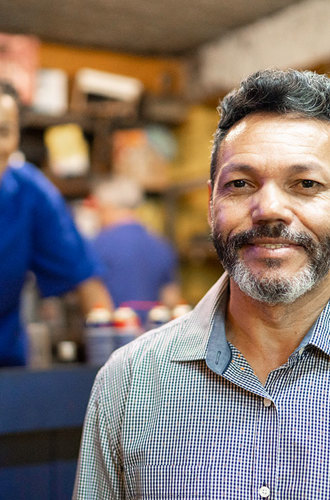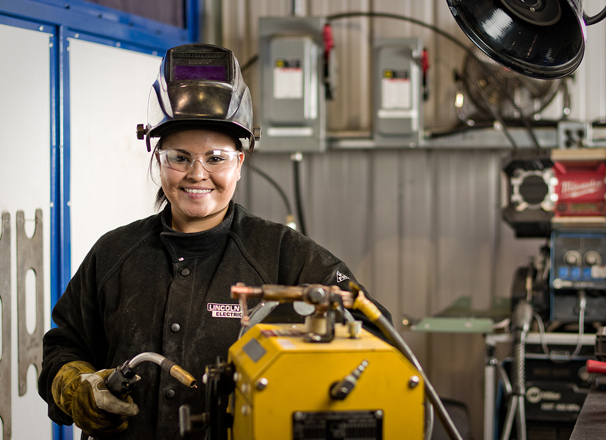
Whether you’re entering the job market for the first time or returning after time away, being job ready can make a big difference. Employers look for people with the right mix of technical know-how, core skills, and confidence to work well with others.
Pre-employment training programs help you build these important skills. They also provide support with resumé writing, interview practice, workplace communication, and any certifications you need for the career you want.
They’re especially valuable if you’re facing barriers like language challenges, disabilities, ageism, or long gaps in your work history.
Why pre-employment training matters
Pre-employment training gives you more than a polished resumé. It helps you feel prepared, capable, and confident in your job search. Designed to help people from all backgrounds and life experiences, these programs can help you take the next step toward meaningful work.
You’ll learn soft skills like teamwork, time management, and how to communicate in the workplace. Many programs also include hands-on training to build technical skills, such as:
- Using workplace technology and software
- Earning safety certifications like Workplace Hazardous Materials Information System (WHMIS) or First Aid
- Learning industry-specific equipment or procedures
- Earning industry-specific certifications
- Developing basic digital literacy skills
The real value of many training programs lies in the connections you make through them. Programs often offer support with job placement, mentorship from industry professionals, networking opportunities like job fairs, and hands-on practice through mock interviews and job coaching. Many also provide continued support after you’ve found work.
This mix of practical experience and professional networking can turn a frustrating job search into real opportunities. It can help you move forward to interviews and job offers.
Best of all, many pre-employment training programs are free or paid by government. You can find them through Alberta’s training and employment services, local employment centres, or organizations that serve specific groups, like newcomers or people with disabilities.
Support tailored to your situation
Pre-employment training isn’t one-size-fits-all. Different programs are designed to meet the needs of different groups, from young people just starting out to experienced workers looking for a change. Here’s how training can help, depending on your background.
Newcomers to Canada
Adjusting to a new country and job market is tough. You might face challenges like language barriers, unfamiliar workplace expectations, or difficulty getting your credentials recognized. These are not minor obstacles—they can feel like enormous hurdles when you’re trying to establish yourself in a new place.
Pre-employment training can help you bridge those gaps. Programs often include:
- English as a second language (ESL) support focused on workplace communication
- Sessions on the culture you will find in Canadian workplaces
- Resumé writing that helps you present your international experience in ways Canadian employers will understand and value
- Help getting recognition of your international credentials
If you’re new to Alberta:
- Visit the Alberta Association of Immigrant Serving Agencies, which connects newcomers to local service providers across the province.
- Try Immigrant Services Calgary and LINC for Newcomers at NorQuest College for tailored services.
- Access bridging programs, which bridge the gap between what you have learned or practiced in your home country and what you need for a Canadian workplace.
- Explore your options through Alberta Supports.
Youth, ages 15–30
Many young people struggle to land that first job. Does “entry-level position requiring 3–5 years of experience” sound familiar? How do you get experience if no one will hire you? It can feel impossible to get your foot in the door.
Pre-employment training for youth often includes exploring possible careers and setting goals. It helps you discover what kinds of work are in line with your interests and strengths. Programs typically offer:
- Resumé-writing and interview workshops tailored to first-time job seekers
- Life-skills coaching and workplace readiness training
- Short-term work placements or internships for hands-on experience
- Financial literacy training for managing your first paychecks
- Peer support and mentorship to build your confidence
These supports help you get that crucial first bit of experience and build the foundation for long-term career success.
In Alberta:
- CAREERS: The Next Generation connects high school students with internships in trades, health care, and other fields that need workers.
- Youth Employment Services (YES) offers a range of supports, including job coaching and training opportunities.
- The training and employment services directory will help you get training and adapt to today’s labour market.
Mature workers (50+)
If you’re over 50 and looking for work, you may be navigating issues with career change or age-related discrimination. You might need to update your skills or your job search methods. But your experience is valuable, and pre-employment training can help you pivot your skills to a new way of doing old things or transfer into an entirely new field.
Many programs for mature workers focus on upskilling, especially in digital literacy and workplace technology. In addition to learning to network with confidence and manage your career transition, you’ll learn to use:
- Online applications
- Video conferencing
- Cloud-based software
MCG Careers and Carya offer employment programs for older adults, including coaching, job search tools, and skills training.
You can also use the OCCinfo database on alis to research job profiles and see where your skills might be useful in new industries or roles.
People recovering from addiction
Getting back to work while recovering from addiction can be a major step forward. But it’s not always easy. You may face things like judgment from others, gaps in your resumé, or low confidence.
Pre-employment programs for people in recovery offer safe, supportive environments that focus on your long-term success—not just getting you into any job. These programs are often “trauma-informed.” That means the people running them know that past experiences like abuse, loss, or violence can affect how you learn, work, and interact with others. They can take steps to make sure you feel safe, respected, and supported.
In Alberta:
- Recovery Alberta offers supports, including peer counselling and recovery-friendly workplace guidance.
- Organizations like Fresh Start Recovery and McMan Youth, Family and Community Services Association offer employment-related support as part of their recovery and housing programs.
Ask your treatment provider or caseworker how to connect with a program near you.
People with disabilities or medical issues
If you’re living with a disability, you may need extra support to get started with work. That could include learning to use new tools, finding supports, or ask for the accommodations you need to excel at your new job. Pre-employment programs can guide you through these steps and help you build skills and confidence.
Some programs use special tools and technology, called “assistive technology”; This makes it easier for people with disabilities to work. They might also help you practise for job interviews, understand your rights, or decide if or when to talk about your disability. In some cases, the program may work with employers to ensure their workplace is a good fit for you.
In Alberta:
- Organizations like EmployAbilities and the Gateway Association offer services for people with disabilities.
- You might qualify for extra help through Alberta’s AISH program or Disability Related Employment Supports (DRES). These programs help pay for equipment, job coaching, or other supports you need to succeed.
Indigenous People
The career paths of many Indigenous job seekers are shaped by their connections to their community, land, and culture. But your career may also be shaped by geographic isolation, systemic barriers, and the impact of intergenerational trauma. Pre-employment programs that recognize these realities can offer support.
Many Indigenous-led programs include cultural teachings, mentorship, and training close to home. This is especially true in areas like trades, entrepreneurship, and community service. These programs give you space to build skills and confidence in a way that honours traditional knowledge and values.
In Alberta:
- The Oteenow Employment & Training Society supports Indigenous job seekers in Edmonton and nearby areas.
- The Rupertsland Institute runs training and employment programs for Métis people across Alberta.
- The Congress of Aboriginal Peoples offers Indigenous Skills and Employment Training (ISET) programs through local Indigenous organizations.
- Trade Winds to Success provides a 16-week pre-apprenticeship training program to First Nations, Métis and Inuit people.
Making the most of your training experience
To get the most out of pre-employment training, show up ready to learn and participate. Set clear, realistic goals for yourself, but stay open to new possibilities.
Try to attend every session, join in discussions, and connect with other participants. These relationships can become part of your future support network.
Financial support and accessibility
Most pre-employment training programs in Alberta are designed to be affordable and accessible. Many are free, thanks to government or community funding. Others offer sliding-scale fees or financial help based on your situation.
Many programs also offer extras to help remove barriers so you can attend the program. Help can include:
- Bus passes or help with transportation
- Childcare during training hours
- Living allowances for those who qualify
- Equipment or supplies needed for the training
- Work clothing or safety gear
Don’t let money worries hold you back. Program staff can often help you find support to make it work.
Get started today
Pre-employment training can help you bridge the gap between where you are now and where you want to go. It’s not just about getting a job. It’s about building confidence, gaining skills, and creating a plan that fits your life.
If you’re ready to take the next step, visit Alberta Supports or check out Alberta’s Employment Services Directory. The right support can make all the difference.





